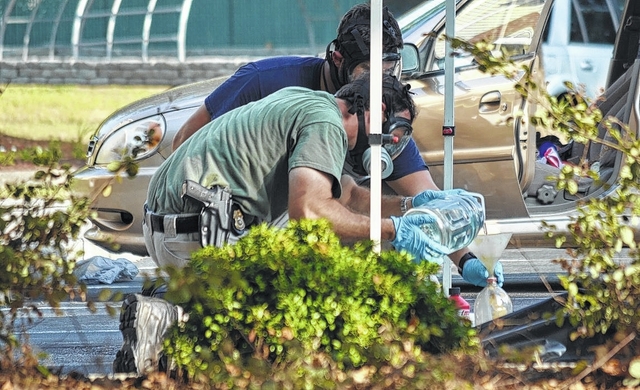ROCKINGHAM — With 21 meth lab busts this year, Richmond County now ranks as the third-highest for clandestine labs in North Carolina, according to the State Bureau of Investigation.
Last month, the county was at No. 2, behind Johnston County. SBI statistics now show Johnston as the second-highest with 25 labs, and Gaston County taking the lead with 26.
This year is shaping up to somewhat mirror 2014 as Gaston led the state with 83 and Johnston was second with 46. The main difference is that Richmond is in-line to move from seventh — tying Stanly with 17 labs — and replace Onslow, which was third with 25.
According to local law enforcement, most of those busts have been for one-pot — or “shake-and-bake” — cooks.
12 METH HOMES
The SBI has reported 12 homes — five in Ellerbe, four in Rockingham and three in Hamlet — to the Richmond County Health Department as meth lab sites since Sept. 1, 2014, according to Environmental Health Supervisor Holly Haire.
The most recent bust was Aug. 4, when deputies seized a three-page list of ingredients and equipment from a home on Wilson Street in East Rockingham.
Kevin McGill was charged with: two felony counts of possession or distribution of a meth precursor; one felony count each of manufacturing methamphetamine and maintaining a dwelling for a controlled substance; a misdemeanor count of possession of drug paraphernalia (a glass pipe, plastic baggies and burned spoons); and three misdemeanor counts of simple possession of a Schedule II controlled substance (amphetamine, Opana, methadone).
Another one of the addresses — 606 N.C. 73 West in Ellerbe — was listed as the home address of Kelly Lowder, who was arrested the previous day on a meth possession charge. It was also the site of a meth raid last December involving Shane King.
King was sentenced in April to 12 years and seven months in prison after pleading guilty to a single count of conspiracy to manufacture quantities of methamphetamine in federal court.
‘ENTER AT OWN RISK’
Several neighbors have written to the Daily Journal claiming that someone was still living at the home, periodically, following the raid, even after the power had been shut off.
Detective Sgt. T. Rucker with the Richmond County Sheriff’s Office said he’s driven by the residence, but it doesn’t look to him like anyone is living there.
“We really cannot keep them from going back in there,” he said. “(They’re) just entering at their own risk.”
State law requires that all properties involved in the manufacturing of meth be cleaned prior to re-occupancy.
“This stuff is very dangerous,” Rucker said. “Nobody needs to be around that mess.”
According to a fact sheet from the Occupational & Environmental Epidemiology Branch of the N.C. Division of Public Health, cooking meth creates a variety of hazards including toxic vapors and spills, fires and explosions. The drug also poses an environmental hazard, as up to 5 pounds of toxic waste is created when meth is made in a lab, which pollutes the surrounding land and water when dumped.
Although the SBI collects most of the ingredients, supplies and product as evidence, smaller amounts of the drug and hazardous chemical residues may remain and may have contaminated surfaces, drains, sinks, ventilation systems and absorbent materials such as couches, carpets, curtains and beds.
‘A PAPERWORK PROCESS’
Local health departments are responsible for overseeing the decontamination process.
“We don’t go out from the health department to do any inspection,” said Tommy Jarrell, county health and human service director. “For us, it’s more of a paperwork process.”
Once the health department is informed of a meth-involved home, officials contact the property owner, who is ultimately responsible for the cleanup. In most cases, Jarrell said, they are rental properties.
Making a residence liveable again involves cleaning to remove chemical residues, debris and possibly furnishings and appliances, according the state fact sheet.
Property owners can conduct the decontamination process, but are encouraged to use a trained cleanup contractor. It may also be more cost-effective to just dispose of some items rather than attempt to clean them.
While complete structure demolition is listed as an option, Haire said that no known meth houses in Richmond County have been destroyed.
State law requires owners of such properties to:
• submit a pre-decontamination assessment to the local health department;
• dispose appliances — such as refrigerators, stoves, hot plates, microwaves, toaster ovens, and coffee makers — used in the manufacture of methamphetamine or storage of associated chemicals;
• dispose all non-machine-washable porous materials, such as upholstered furniture and mattresses;
• remove all carpet and padding;
• clean, paint or remove non-porous materials (walls, ceiling, floors);
• remove excessively stained plumbing fixtures; and
• provide written documentation of the decontamination to the local health department.
Of the 12 residences reported, Haire said only one has been cleared for habitation.
After receiving and reviewing the decontamination documents provided to them by the property owner, local health departments are required to keep them on file for three years.
Reach reporter William R. Toler at 910-817-2675 and follow him on Twitter @William_r_Toler.

